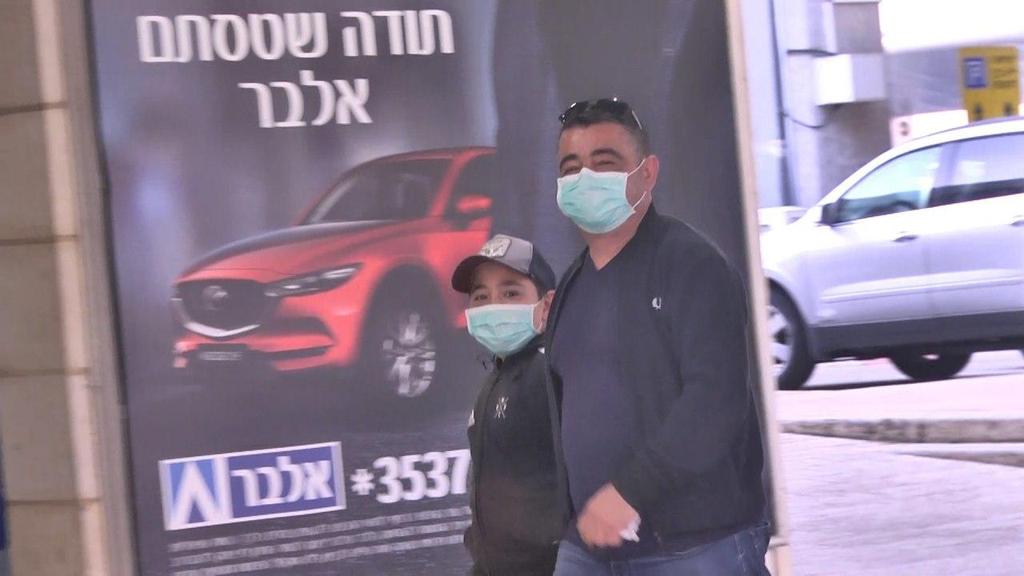Getting your Trinity Audio player ready...
Israel rolled out its first measures to assist local businesses as the main Tel Aviv Stock Exchange indexes, rattled by the global coronavirus outbreak, fell sharply for the second day running.
The Finance Ministry said it was opening an NIS 4 billion ($1.1 billion) credit line for banks to lend money to small and medium-sized businesses facing a cash crisis with a high-level government guarantee.
"No doubt the fact that the global coronavirus crisis is meeting Israel with a strong economy, low unemployment, a high credit rating and a dropping debt-to-GDP ratio will help us weather the crisis with minimal damage to the economy," Finance Minister Moshe Kahlon said in a statement.
Israel has taken some of the most extreme precautions to prevent a local coronavirus outbreak, forcing tens of thousands of Israeli travelers who had visited many countries in Asia and Europe into home isolation.
The government is considering expanding the quarantine measures to all other countries, which would effectively cut Israel off from the rest of the world. A decision was expected later Monday.
4 View gallery


Finance Minister Moshe Kahlon and Prime Minister Benjamin Netanyahu
(Photo: Alex Kolomoisky)
This has made travel and trade difficult, with tourism expected to take a big hit.
“We’ve had numerous cancellations in the course of the last week," said M., a Tel Aviv resident who rents out his city-center apartment on Airbnb.
"Most of our guests are from Germany, so we’re seeing a drastic decline in booked days. I am not sure how we are going to weather this virus."
The cancellations are also being felt by thousands of tour guides who are self-employed and work from job to job.
"Entire tour groups are cancelling their trips and self-employed tour guides are losing their incomes," said N., who just had a group cancel.
"Luckily, we have a new deal brokered by our union that for the first time provides unemployment benefits even for self-employed guides when we have no money coming in."
Yoni Shapira, the head of Moreshet Derech - Israel Incoming Tour Guide Association said: "We are working on getting information from hundreds of guides who have had groups and private clients cancel their trips, in order to understand the magnitude of this crisis for tour guides."
The government is considering expanding the quarantine measures to all other countries, which would effectively cut Israel off from the rest of the world. A decision was expected later Monday.
The restaurant business has also taken a hit, in particular as Israel is now celebrating the normally rambunctious Purim holiday.
On the other hand, there is a considerable leap in order for ready-made food, especially from fast food chains. Sometimes the delivery person is asked to leave the meal at the door because the people inside are in quarantine.
4 View gallery


Israelis in Tel Aviv dress up as health officials for Purim, which has this year been overshadowed by coronavirus
(Photo: Moti Kimchi)
Ronen Nimni, the owner of the Café Café group that has more than 300 outlets, said: "There is no doubt that there has been a decline in the number of Israelis spending money in cafes and restaurants in recent weeks, with the most significant drop in business revenue of about 20% in the past week."
Even so, he said, "the group is experiencing a significant increase in revenue from its deliveries across various chains, such as hamburger and meat eateries, most of which are reporting almost a 40% increase in deliveries. Hopefully, this health and economic crisis will soon be over and we will be back to normal."
A franchise holder in the popular Landwer franchise says that "demand has declined," with a decline in visitors and 15-50% less turnover at its branches. Israel's normally bustling cafes are reporting a lack of customers and a 30% decline in revenue last weekend.
While the impact has yet to be truly felt at upmarket restaurants in central Israel, the chefs are worried.
Avivit Friel, a chef at the Ouzeria and Ouzeria Next Door restaurants, says: "Diners have begun to worry about sitting in restaurants next to other people. The demand for table reservations fell by 15% last weekend, and yesterday afternoon was also not as full as expected in a vibrant city at Purim."
4 View gallery


L-R: National Security Adviser Meir Ben-Shabbat, PM Benjamin Netanyahu and Health Minister Yaakov Litzman hold a coronavirus video conference from Jerusalem with European leaders, March 9, 2020
(Photo: AFP)
The uncertainty has put off investors and the blue chip Tel Aviv and the broader TA-125 were down 5%, similar to drops a day earlier. The shekel, which peaked against the dollar in mid-February at 3.416, was trading at about 3.5 at midday.
Prime Minister Benjamin Netanyahu, who refers to the crisis as a global pandemic, made clear that public health is paramount and that Israel will continue taking stern measures if necessary, but he emphasized that economic needs will be taken into account.
Netanyahu organised a video conference with leaders of Italy, Austria, Hungary, Bulgaria, Romania, Croatia and Cyprus to discuss cooperation during the crisis.
"We each have our own experiences. We see what works, what doesn't work and we can trade with each other," he said during the conference call, which was open to the media.
The Bank of Israel has said it does not expect a major economic impact if the virus is halted in the coming months, but that it is ready to use monetary policy tools "whenever necessary" should conditions worsen.


